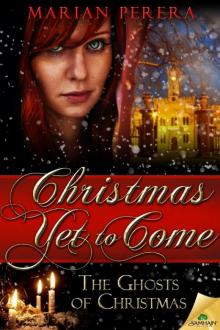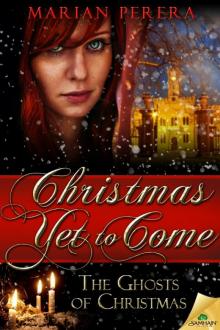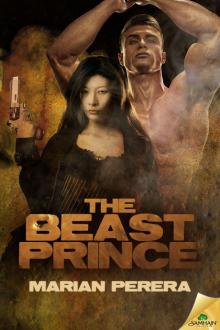- Home
- Marian Perera
Christmas Yet To Come (The Ghosts of Christmas)
Christmas Yet To Come (The Ghosts of Christmas) Read online
The woman under the shroud gets her turn under the mistletoe.
The Ghosts of Christmas, Book 1
The Ghost of Christmas Yet To Come has had enough. No more being the third act in a make-them-repent performance, terrifying people with visions of death. But after twenty years as a faceless wraith, rebellion has consequences.
On the night of December 23rd, 1875, she becomes human—and lands facedown in the snow beside a shabby house. Wearing nothing but her shroud.
As is his custom, banker Justin Welland plans to spend Christmas with his nose to the grindstone. Finding a near-naked woman on his doorstep not only startles him out of his careful routine, “Laura Snow” makes him want to discover the secrets behind her slightly eccentric behavior, her beautiful eyes—and her ability to walk through a wall into his bedroom.
A sizzling kiss rekindles the warmth in Laura’s body and soul. But when a mirror shows her a vision of blood and death, she realizes that if she abandons her ghostly role, someone—maybe Justin—will have to take her place.
Warning: Contains a tightly buttoned-up banker who creates a special Christmas for a woman, and a ghost who discovers being alive has some unexpected…benefits. Also, a kiss that will curl your candy cane.
Christmas Yet To Come
Marian Perera
Dedication
For Emily Cowan,
fellow writer and maker of the most creative cards ever.
Merry Christmas to you and your family!
Chapter One
She landed facedown in a snowbank, the breath knocked out of her by the fall.
The Ghost of Christmas Yet To Come lifted her head and sucked in a gasp. Cold prickled in her nose and all the way down. It was like inhaling thistledown ice.
It had never occurred to her that her rebellion would end like this, sprawled in the snow with an unfamiliar solidity filling her shroud. Her senses reeled with a disorientation only heightened by the rasps of someone’s hoarse breathing, with the shivers of the strange body that trapped her. Every inch of skin covering that body cringed away from the snow.
She struggled up, panting, and looked around. The drift was piled high and smooth except for the flattened place where she had landed, and she supposed she was fortunate not to be hurt. She wasn’t afraid of dying—she’d seen so much of that—but her body felt only too human. The thought of lying on a path with broken limbs, wriggling feebly like a worm for hours, was not a pleasant one.
Ahead of her, a wedge of light slanted through the darkness—the only reason she could see the drifts at all now—and the light glowed from one of the windows of a large house. The sight held her like a moth. Until a few moments ago, in all the years of her existence as a ghost, she’d never felt cold, especially not the kind of raw chill that bit deep into her flesh.
Until a few moments ago, she had been the cold.
She got to her feet, clutching the shroud tightly around her. The house was only a few yards away, but she felt as though she was walking across bits of broken glass. She stumbled up broad stone steps and moved an arm away from her body. The hand on the end of that arm slapped against the front door.
After a moment’s thought, she made a fist instead, and banged on the door with that.
There was silence from inside, and she wondered what she would do if no one answered. If she somehow felt genuinely sorry for her moment of rebellion, if she looked up at the stars promising to return to her duties and carry them out faithfully, would she be allowed to return? She hadn’t enjoyed being a merciless wraith who brought people to their knees, but she didn’t want to slowly freeze either.
Or die, because she’d already done that once and had no desire to ever repeat the experience.
Oh please, answer. In the back of her mind, she had the impression something was missing from the door, but she was too chilled to care. She thumped again, her teeth chattering. Damn it, answer!
Gathering her shroud around her, she walked straight ahead into the door.
The impact thudded through her face and sent her staggering back. Her foot turned on a piece of ice and she would have sprawled flat—probably snapping her spine against the steps, with her luck—if she hadn’t caught at a large stone pot that contained an evergreen shrub. The prickly greenery scratched at her, and she closed her eyes, breathing hard and waiting for the stinging in her nose to subside.
She was definitely not a wraith now.
A bolt rattled back with a metallic slide and the door creaked ajar. She couldn’t quite see who had opened it, only that the person carried a branch of candles that made her long to hold her numb hands to the flames. Blinking tears out of her vision, she tugged her shroud free of the spiky evergreen. The greying cloth tore as it came away.
“May I help you?”
It was a man’s voice, courtesy clearly struggling with incredulity. She straightened up.
“Could I come in?” she said. “Please. I’m very cold.”
Her breath puffed out in clouds as she spoke, and the man stepped aside in a wordless invitation. She hurried in before he could change his mind.
The house was dark except for the candles, but anything would have been better than the snowdrifts. A worn carpet felt slightly rough beneath her bare toes, and there was a faint resiny scent in the air, like well-polished wood.
The door swung shut, startling her a little, and she glanced at the man who had let her in. He was dressed far more warmly than she was, in a wine-colored jacket that looked soft enough to be velvet, black trousers and shoes she wished she could have. Tilting his dark head sideways, he studied her as if not quite certain what he was looking at—which she supposed was understandable. His gaze went over her from head to foot, slowly, then traveled up again.
“What were you doing in my garden?” he said.
Oh, damn. She could hardly say she’d finally had enough of showing people misery and death, especially with pressure on her to be the finisher who made them beg for a second chance. If he thought she was crazy, he might tell her to leave the house, and then she’d die on the front steps like a less heartbreaking version of the little match girl.
“I—I don’t remember,” she said.
It wasn’t the most convincing lie anyone had ever come up with, and she could tell he didn’t believe her. Hopefully he was enough of a gentleman not to turn her out, but his brows went up.
“Do you remember your name?” he said.
Name. She needed one of those, because she didn’t think pleading blank-slate memory to everything would work. Besides, if he thought of her as a person, he’d be less likely to make her leave, and a name might help in that regard.
She’d had a name originally, but she’d forgotten it as she’d forgotten most of her life, because once she’d lost that life—or thrown it away—those memories could only hurt her with their existence. Even if she remembered her name, it would be best not to use it, because that girl had been laid to rest a long time ago. The Ghost of Christmas Yet To Come wasn’t the same person, not by any means.
Yet the only other names she knew were those of all the people she’d targeted through the years, and she didn’t want to use any of those.
Instead, she recalled a gravestone—she’d seen a lot of those—engraved with the name Laura. It had made an impression on her because she was always aware of how much time people had, and the date and the hour when that time would run out.
Except the dates of birth and death on Laura’s headstone had been the same. Her time had begun a
nd run out on the same day, like an hourglass with a single grain of sand in it. And yet she’d been important enough to be remembered, her name carved in stone. The Ghost of Christmas Yet To Come had no idea who Laura was, only that she had once existed, and that she had mattered to someone.
“Laura.” She remembered she needed another name, and the first thing she had touched as a human came to mind. “Laura Snow.”
The man still looked skeptical, but he inclined his head as if making a mental note of that. “Justin Welland.”
A hollow echoing clang sounded in the distance, as if it rang out over miles of night and falling snow. Her hands tightened on the edges of her shroud, but Justin Welland didn’t react at all to the sound. Which meant only she had heard it.
Which meant his name had tolled a bell.
He crossed the entrance hall and opened another door. “Please, sit down. Make yourself comfortable. I’ll get you something to drink.”
The room was a parlor, she realized when he set the candelabrum on a sideboard. Two armchairs patterned with faded flowers were drawn up to a fireplace, and Justin knelt before it to prod the embers with a poker. He blew on their glowing undersides and laid on more coal.
Laura—as she supposed she would have to be until she returned—sat on the edge of one armchair to be as close to the fire as possible. Justin left the room, his footsteps growing quieter and trailing off into silence.
She held her hands out to the hearth, but now that she was no longer in imminent danger of dying, she noticed how quiet the house was. Perhaps the servants were asleep at this hour. Although she had no idea who he was, she had a sneaking suspicion that even after she’d refused to continue in her assigned role, she’d been sent here to turn him aside from his path.
Ghost or human, apparently it didn’t matter what she was as long as she scared him into submission.
Her feet throbbed a little as they began to warm. There was a gilt-framed mirror over the sideboard, and she toyed with the idea of looking into it. She’d never thought of having a face again, but obviously Justin hadn’t glanced past the cowl of her shroud and seen an abyss. Before she could get up, though, footfalls grew louder and he came back in.
“Here.” He put a china basin on the floor before her and poured water in from a jug. “Put your feet in.”
She did so, and stifled a sigh of relief at how good it felt. Her feet needed washing as well, after she’d walked barefoot up the drive. Justin had a bedroom slipper tucked into each pocket of his jacket, and he set those on the floor before unfolding a dark-green dressing gown he’d carried over one arm. He handed the dressing gown to her, then went to the sideboard.
He’d turned his back deliberately, she realized, to give her a chance to doff the shroud. For a moment she thought of putting the quilted dressing gown on over it, because she couldn’t ever remember not wearing the shroud. But while it was soft as the wings of a fallen angel, it was also uncomfortably damp with snowmelt, not to mention far too thin to keep her warm even if it had been dry.
She got up and shrugged it off, tossing it down to the hearthrug before she pulled the dressing gown on. At least she’d seen plenty of people wearing those, so she knew what it was supposed to look like. Behind her, liquid sloshed and there was a soft tink as a stopper was replaced.
“Thank you,” she said when he handed her a round-bellied glass filled with amber. He sat in the opposite armchair, cradling his own glass in the palm of one hand, so she was careful to do the same with hers.
“What else do you remember about your life?” he asked.
“Nothing.” She raised the glass to her face so she could concentrate on that instead. The strong fumes curled up into her nose like a pungent smoke.
It wasn’t true, because she did remember how she’d died. The whipcrack sound of ice breaking underfoot, the roar of water, the cold so intense it stripped her flesh from her bones. Everything else was lost in the darkness, but not that memory, perhaps because it served as a warning to her: what happens as a result of disobedience and willfulness. Obviously a warning she hadn’t taken seriously enough.
There was no change in his expression except for a slight narrowing of the brown eyes fixed on her. “Come now. If you know your name—”
“If I knew where I lived, don’t you think I’d have been there instead of lying in the snow wearing a sheet?”
He said nothing as he drained half his own drink, and she hoped the balance had tilted a little in her favor. Maybe her bluntness had disconcerted him. But in the next moment, it was clear he’d only paused to regroup before coming at her from another angle.
“You have a point, but it seems unusual at best for a…young woman to spontaneously lose her memory.” Once again, his gaze went over her. “You don’t look hurt or injured in any way.”
“You must be a doctor.”
His smile was slight, as if to both acknowledge the barb and to tell her he didn’t care. “I’m a banker.”
If she had been holding the glass by its stem, she would have dropped it. Of course he was a banker. The first man who had been taught the true meaning of Christmas by three spirits had been a moneylender. Time marched on inexorably, but some things never changed.
“Is something wrong?” he asked.
Laura managed a shake of her head. “Not at all.”
“You went a little pale.”
“Probably just—the strain. Of the day.”
“Well, once you’ve finished your brandy, I’ll fetch some food. Nothing hot, I’m afraid, because I had my supper two hours ago.”
So now she knew what she was drinking. She tilted the glass and took a gulp that scorched its way down her throat. Muffling a cough in one sleeve, she blinked the tears from her eyes for the second time, but the sting soon faded to a pleasant heat spreading out from her stomach. By the time she finished the glass, she thought she could melt all the snow outside by breathing on it.
“Could I have some more?” she asked, but from his startled look, she knew that had been a mistake. He was clearly concerned he’d taken in someone with a weakness for the bottle, and her face grew warm in a way that had nothing to do with the brandy. She set her glass down quickly.
“Do you live alone?” she asked, to cover up her gaffe.
Justin leaned back in his armchair, stretching long legs out before him. “I don’t have any family here. But I hardly think the proprieties matter now, if that’s what you mean.”
She supposed wearing nothing but a shroud would have compromised her enough without her being in his house at night minus a chaperone. Besides, what other choice did she have—to freeze respectably outside? “No, I don’t think so either. But don’t you have servants?”
“Oh yes, of course.” He got up to take her empty glass. “But I gave them three days off.”
She had been prepared to hear he had one maid-of-all-work who was grudgingly permitted a few hours’ sleep each night. Three days off sounded more than generous.
If he was telling the truth, why was she even here?
She looked around the parlor and had her answer at once. It was clean and tidy, if a trifle shabby, as though everything in it had been well-used for several years. But no sprigs of berried greenery decorated the windows or the mantelpiece. The vivid colors of crackers, the autumn scent of gathered nuts warmed near the fireplace, the rustle of stockings—oh, with none of those, she was on familiar ground again. She even realized what had been missing from the front door—a wreath bound with red ribbon.
“But you don’t celebrate Christmas yourself?” she asked.
“I don’t see any reason to.” Justin’s tone made it clear he had no interest in the topic. “Excuse me, I’ll bring the food.”
He left, while Laura took her feet out of the basin now that the water was cooling. She toasted them before the fire until they dried, then bent her l
egs and tucked her feet up under her to keep them warm. Finally she leaned back in the armchair to think, which wasn’t easy after the brandy, but she gave it her best effort.
It had to be the fact that he didn’t observe Christmas, because—well, because that was what it was always about. And yet he didn’t strike her as a miser who ill-treated his fellow human beings. Or her, for that matter. Show hospitality to strangers, the proverb went, because some have entertained angels unawares.
What kind of angels, the proverb didn’t specify.
Not that it seemed fair to repay his hospitality by frightening him out of his wits with visions of his death—assuming she could even do so now she was human. But the visions were only for the hardest and coldest people, those who had no compassion at all for others. Surely for someone like Justin Welland, she wouldn’t need to go to such an extreme.
That was a much easier prospect on her mind, because she hadn’t liked constantly orchestrating Act Three of a “soften ’em with sugar and hit ’em with horror” play. She showed people the truth, but there was something…dispiriting, for lack of a better word…to see how low they could sink. She didn’t enjoy hearing them plead with her, even if that was better than her having no effect on them.
Though somehow she couldn’t see Justin cringing and begging, not even if she put on the performance of an eternity.
She leaned down and stirred the puddled shroud with a fingertip, then relented and hung the cloth up neatly on a fireguard. But she didn’t need to perform for him, did she? He wasn’t anywhere near as bad as some of the people she’d intimidated with her faceless silence and the visions she showed them of empty lives followed by full graves.
So as long as he treated other people decently, why did it matter whether he kept Christmas or not? That might have been a blasphemous thought, but she’d been having a lot of those recently. Besides, she’d already been turned human and had apparently lost all her powers. What more could happen?
Justin came in, put a little folding table between the two armchairs and set a tray on it. She expected him to sit down, but instead he remained where he was, looking at her with a furrow between his brows.

 Christmas Yet To Come (The Ghosts of Christmas)
Christmas Yet To Come (The Ghosts of Christmas) Christmas Yet to Come
Christmas Yet to Come The Coldest Sea
The Coldest Sea The Beast Prince
The Beast Prince The Deepest Ocean (Eden Series)
The Deepest Ocean (Eden Series) The Highest Tide
The Highest Tide